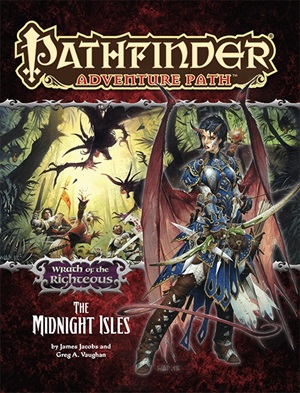
Each week, I’ll pester one of my creative colleagues with five questions about his or her work. Most of these folks are friends, a few are secret enemies, and one has been blackmailing me for years.
For a while, as far as I knew him, James Jacobs was “the new guy” who worked on the far side of the cube farm in the first Paizo office. (They’re now in their third.) He’d come aboard to work on Dungeon after I’d migrated to a galaxy far, far away. It took a while for us to realize we had a shared interest in horror and Asian cinema. It’s taken him and Wes Schneider even longer to forgive me for inviting them to see what turned out to be one of the less coherent examples of both forms.
Even though I’ve long since departed the Paizo offices for the northern prairie, Pathfinder Tales and the Seattle International Film Festival bring us back together now and then. And while I forgive James and Wes for refusing to let me choose the movies, I rely on them to introduce me to the best breakfast joints that have sprung up in Seattle since I left.
1. You’re best known as a designer of RPG adventures, and H.P. Lovecraft is an obvious influence on your choice of subject matter. Who are some other authors or filmmakers who have influenced your game writing?
Lovecraft is hands down the biggest influence on my writing, but not the only one. His pulp companions Robert E. Howard and Clark Ashton Smith are important as well (Clark Ashton Smith’s Xothique stories having been a huge inspiration for the necromancer empire in my home-brew setting that would eventually itself inspire and inform the nation of Thassilon on Golarion), along with modern writers like Clive Barker, Stephen King, Dan Simmons, and Ramsey Campbell.
Horror, for the most part, is what inspires me, and that carries over into film, with the works of directors like John Carpenter, Guillarmo del Toro, and Akira Kurosawa being very inspiring (yeah, I know Kurosawa’s not a horror director, but he’s awesome!). George R.R. Martin is my favorite fantasy author of the moment. For some more obscure writers and film directors, I’d have to give call outs to T.E.D. Kline, Tim Lebbon, Thomas Ligotti, and most recently Joseph Payne Brennan have been huge influences on the writer side of things. As for more obscure film directors, I’d call out Ti West, Xavier Gens, Pascal Laugier, Gareth Edwards, and Mike Flanagan as having delivered some truly unforgettable and inspiring movies.
2. I once watched in awe as you began a Call of Cthulhu session at PaizoCon. Not only were you great, but you had three or four great players at your table. What struck me is that none of you were performing in the sense of improv actors, but the talk was so fluid and conversational compared with the awkwardness we often see at convention gaming tables. How do you do that? Is that how all your games go, or was that an anomaly? If it’s always that way, how do you do that?
Well, thanks! You’re making me blush! I suppose it’s no real secret that having great players at a table really helps to make a game overall much better, and when I’ve got great players at my table, they inspire me to do better. At the very least, they’re constantly giving me new things to go on and to expand upon.
I’m not afraid to throw out parts of the adventure’s plan if, for example, a player comes up with a much more interesting interpretation of a clue or whatever; not only does that make the game more fun, but it gives the players the feeling that they figured things out. In any event, being good at improv is, I think, an essential skill for a GM. You have your script (in the form of an adventure), but the players are really good at going off script. Being a voracious reader and watcher of films helps here—you build up a lot of material in your head when you immerse yourself in stories like that, and it also certainly helps to have spent some time acting as well—I was pretty active in the drama club in High School, and dabbled a little more in college with a few acting classes as well. In any event, that’s more or less how I run all of my games. I’m not afraid to let the dice get set aside once the players and I start getting into playing out conversations and the like with NPCs. I run very few convention games, in any event, so all of that comes from my home games I’ve run over the past three decades.

3. The world of Golarion is vast and varied, yet it seems certain areas (notably Varisia) are much more popular among players than some of those that depart from the European paradigm. With the Jade Regent Adventure Path, you seemed to have a strategy to ease Euro-centric players into Tian Xia. How well did that strategy succeed? And how would you apply it in bringing players to areas like Osirion (soon), Qadira, or Vudra?
I think that the strategy worked pretty well. I do kinda wish we’d gotten to Tian Xia at least one adventure sooner, but the way in which that Adventure Path “eased” players into playing a game steeped in Asian mythology and inspiration was always the intent.
For an adventure set in Osirion, Qadira, or Vudra, we can kinda cheat—there are nations in the Inner Sea region that are already all about those cultures—they’re right there on the map, bordering (or near bordering) other more European-themed nations. As such, it’s much easier I think to do adventures there, since you can allow the players who prefer more European tropes in their games to simply play “next door neighbors” visiting the area.
For the upcoming Mummy’s Mask Adventure Path, we’re starting in Osirion and staying there the entire time—we’ve done enough with that nation already that I think folks are familiar enough with the ideas there already that we don’t need to ease anyone in. It certainly helps that we’ve done a few adventures set there already, and that one of the factions for the Pathfinder Society organized play campaign is Osirion!
4. I’ve heard that you’d like to write fiction but just can’t find the time. How much of the fiction itch does writing game adventures already scratch, and what additional or different satisfaction do you anticipate when you do write that first novel?
Writing adventures is certainly fun, but for me, at least, it only intensifies the itch to write fiction.
The main difference between writing fiction and writing adventures is that when you write an adventure you’re missing out on the chance to write the best part of the story—the protagonist’s role. In an adventure, those roles are played by the player characters, and you have to be comfortable with that if you’re writing an adventure. Comfortable with the fact that, no matter how much work you put in on what you write, those NPCs are often just gonna end up being reduced to numbers and things to loot in the end. Comfortable with the fact that in a typical group, only the GM gets to actually read what you wrote—what the others at the table get to experience is more the GM’s creation than yours.
It’s weird, for example, seeing a bad review of an adventure you wrote and reading it and realizing that all the things the writer was complaining about are bad ideas introduced (unknown to the reviewer) by the bad GM. Or likewise, seeing a great review of an adventure you felt was terrible, because the GM was brilliant and turned a poor adventure into a masterpiece.
I’ve written a fair amount of short fiction, and have plenty of ideas for novels in my head, what I’m really looking forward to there is the ability to spend time with characters I have full control over, rather than spending time on the surrounding characters whose fates I have no control over… and to seeing more people check out my writing, I suppose.
5. Like some of your Paizo colleagues, you have a reputation for liking the dark and scary stuff. Yet I have a feeling you have some big, bad phobias knocking around in your imagination. What is your worst one?
I hope this doesn’t backfire, but the worst one is, hands down, clowns. I’m not a fan of crowds (and as such conventions tend to be high-stress for me), and tsunami are the most often-repeated themes in my actual nightmares, but clowns are the thing that distress me the most. Ugh.
Keep up with James’ latest hijinks at Bigfoot Country.
And if you missed yesterday’s Crossing the Streams book giveaway, check it out.
